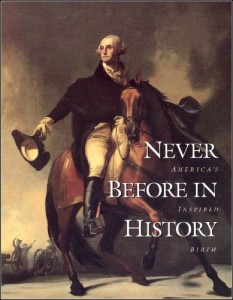

Before we move on, though, I’ll add just a bit where Janie left off yesterday. Was the Declaration of Independence a Christian document? I had the opportunity to talk with the publishers of a kids’ book (edited by William Dembski of the Intelligent Design movement) recently, and they gave me a little back story on their book, Never Before in History: America’s Inspired Birth. Unlike most kids’ books that either ignore the founders’ faith or criticize it for blind spots, this book actually starts with Martin Luther and the Protestant Reformation. Luther’s mantra of “liberty of conscience” was born not only out of the persecution he received from church authorities, but out of his theology. He believed in something the authors of Never Before call the “creator-redeemer” distinction. While human governments have to govern a man’s body and actions (his impact as a created being), they don’t have authority over his soul (what he believes and whether he is redeemed). The idea of the consent of the governed is traced to the Puritans’ Mayflower Compact, and beyond. And many of Jefferson’s phrases are lifted right out of Christian writers’ mouths.
While it’s probably too late for most folks to run out and get a book like Never Before in History or even Sam Fink’s Declaration of Independence–an illustrated treatment of the actual text, it’s not too late to print off a copy of the real thing and read it with your kids. Here is my suggestion on how to make it fun, if you’re game.
Get out pen and a sheet of paper, and explain that the Declaration of Independence was kind of like a letter to King George III from our founders. Thomas Jefferson and the other signers wanted to “declare” or tell King George and everyone else why they were starting a new country. Then use the real Declaration of Independence as a guide to write your own letter to King George. Go line by line, or even just paragraph by paragraph, and tell him in your own words why you and the other colonists are starting your own country. (And don’t be afraid to get creative–use a valley girl accent, or pirate language if you’re brave!)
When reading the text or talking about Janie’s questions from We Hold These Truths, here are a few specifically Christian terms that you can emphasize:
1. Laws of Nature and Nature’s God: The idea that God made the world was very important to the founders of our country. When God made the world, He created laws to govern the universe—like the law of gravity. (Try dropping your pencil and see how many times out of ten it goes down.) But God’s laws aren’t just about science and how things work. God made people to live by certain rules, too. The Ten Commandments are some of those rules. Although it was breaking the laws of England for them to rebel, Thomas was saying that they weren’t breaking the law of God.
Some believe by leaving out Jesus here and saying “nature’s God”, Thomas was trying to leave out Christianity. But actually, he was drawing on hundreds of years of Christian thought, which included this quote in Sir Edward Coke’s Common Law: “The law of nature, which indeed is the eternal law of the creator, infused into the heart of the creature at the time of his creation, was [before any written laws], and before any judicial or municipal laws.” (p. 129, Never Before in History)
2. Unalienable Rights: Because we have a Creator, because God made us a certain way, we possess certain rights and responsibilities. That doesn’t mean those choices can’t be taken away or abrogated. If someone murders someone else, they have taken away their right to “life, liberty and the pursuit of happiness.” If a government tells people they can only have one baby, or that they can’t go to church, that would be taking away their rights too. But Thomas was saying here that people who take away these rights are breaking God’s law when they do that. And good men should fight against it.
This was a very old idea, “inalienable rights” was a term started by Catholic lawyers as early as the 12th century, and Sir William Blackstone’s Commentaries in the 1700s spelled out what the founders believed:
“For the principle aim of society is to protect individuals in the enjoyment of those absolute rights, which were vested in them by the immutable laws of nature…Hence it follows, that the first and primary end of human laws is to maintain and regulate these absolute rights of individuals.” (p. 68-71, Never Before in History)
3. Secure these rights: What is a government for? Thomas says, it’s to make sure the people have their rights and no one takes it away from them. That doesn’t mean the people will always be happy. But no other man should be able to snatch their rights away. (See Romans 13:4)
4. Consent of the governed: Should one man be able to make himself king and tell everyone what to do? Think about your playground—just because a kid is bigger, should he be able to make everyone get off the slide? Should he be “king” of the playground and get to tell everyone what to do just because he’s bigger and stronger than the other kids? Of course not. And Thomas was saying that neither should real kings—including King George III. Earthly kings should only be in power if the people they rule say it’s ok. This was an old idea, which was very popular among the Puritans. (For more on how the Mayflower Compact and the Puritans generally spelled out this idea long before Locke and the Enlightenment, see p. 40 as well as p. 139-130 in Never Before in History.)
For more on the Christian influence on the Declaration, I highly recommend Never Before in History–it’s a great textbook for older kids, as well as a coffee table book your kids can grow with.
Don’t forget to check out Janie’s 4th recommendations here and here, as well as our podcast with Susan Olasky and print interview with Carol Swain. And here’s an older review I did of Jon Scieszka’s Oh Say I Can’t See.
Stay Up to Date!
Get the information you need to make wise choices about books for your children and teens.
Our weekly newsletter includes our latest reviews, related links from around the web, a featured book list, book trivia, and more. We never sell your information. You may unsubscribe at any time.
Support our writers and help keep Redeemed Reader ad-free by joining the Redeemed Reader Fellowship.
Stay Up to Date!
Get the information you need to make wise choices about books for your children and teens.
Our weekly newsletter includes our latest reviews, related links from around the web, a featured book list, book trivia, and more. We never sell your information. You may unsubscribe at any time.
FREE Bible Guide!
Get a guide to the Best Bibles for Children and Teens. Perfect for an Easter gift.
We'd love to hear from you!
Our comments are now limited to our members (both Silver and Golden Key). Members, you just need to log in with your normal log-in credentials!
Not a member yet? You can join the Silver Key ($2.99/month) for a free 2-week trial. Cancel at any time. Find out more about membership here.

